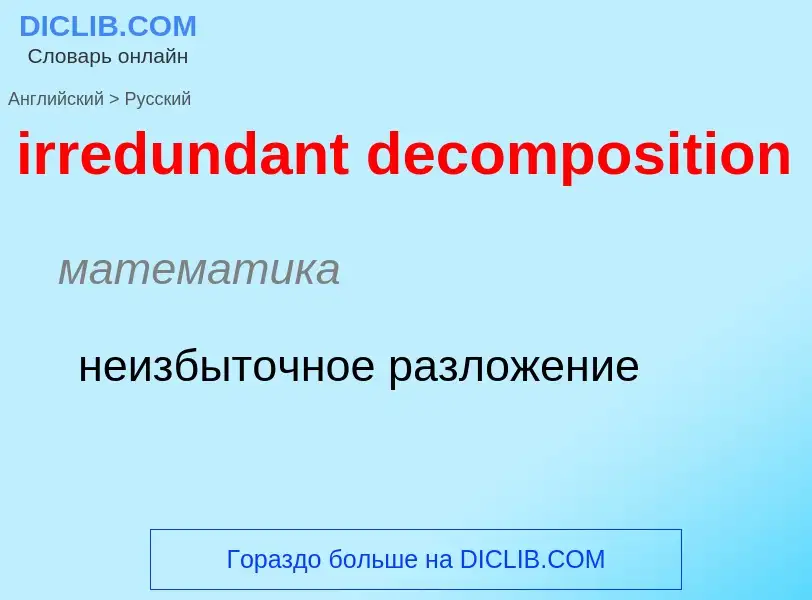Geben Sie ein Wort oder eine Phrase in einer beliebigen Sprache ein 👆
Sprache:
Übersetzung und Analyse von Wörtern durch künstliche Intelligenz ChatGPT
Auf dieser Seite erhalten Sie eine detaillierte Analyse eines Wortes oder einer Phrase mithilfe der besten heute verfügbaren Technologie der künstlichen Intelligenz:
- wie das Wort verwendet wird
- Häufigkeit der Nutzung
- es wird häufiger in mündlicher oder schriftlicher Rede verwendet
- Wortübersetzungsoptionen
- Anwendungsbeispiele (mehrere Phrasen mit Übersetzung)
- Etymologie
irredundant decomposition - Übersetzung nach russisch
THEOREM
Lebesgue decomposition theorem; Lebesgue decomposition
irredundant decomposition
математика
неизбыточное разложение
chemical decomposition
BREAKDOWN OF A SINGLE ENTITY (NORMAL MOLECULE, REACTION INTERMEDIATE, ETC.) INTO TWO OR MORE FRAGMENTS; OPPOSITE OR REVERSE PROCESS OF A SYNTHESIS REACTION
Decomposition reaction; Decompose (chemistry); Chemical degradation; Chemical breakdown; Decomposition product; Decomposition (chemistry)
нефтегазовая промышленность
химическое разложение
decomposition product
BREAKDOWN OF A SINGLE ENTITY (NORMAL MOLECULE, REACTION INTERMEDIATE, ETC.) INTO TWO OR MORE FRAGMENTS; OPPOSITE OR REVERSE PROCESS OF A SYNTHESIS REACTION
Decomposition reaction; Decompose (chemistry); Chemical degradation; Chemical breakdown; Decomposition product; Decomposition (chemistry)
общая лексика
продукт распада
Definition
Decomposed
·Impf & ·p.p. of Decompose.
II. Decomposed ·adj Separated or broken up;
- said of the crest of birds when the feathers are divergent.
Wikipedia
Lebesgue's decomposition theorem
In mathematics, more precisely in measure theory, Lebesgue's decomposition theorem states that for every two σ-finite signed measures and on a measurable space there exist two σ-finite signed measures and such that:
- (that is, is absolutely continuous with respect to )
- (that is, and are singular).
These two measures are uniquely determined by and

